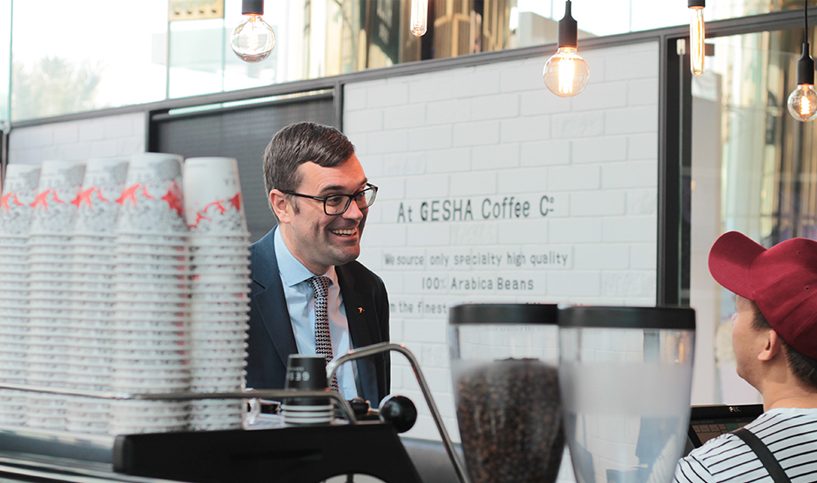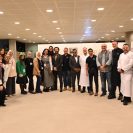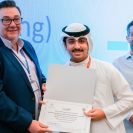Who knew that the flat-white is an Australian invention? The Ambassador, sans entourage, divulges this tidbit and it is representative of many surprising things we don’t know about the nation that contributed to the coalition during the liberation of Kuwait in 1991. Chatting in Australian concept Gesha, home of the rainbow latte, we delve into the past and future of both Kuwait and Jonathan Gilbert.
What has been the single most significant benefit from 45 years of diplomacy between Kuwait and Australia?
I think the growth in the value and scope of trade and investment between our two countries is something that should be celebrated by both sides, the relationship has blossomed, especially in regards to people-people links, and it continues to grow.
Education is a good example. We have had postgraduate and undergraduate Kuwaiti students reading medicine, pharmacy, engineering, environmental science or business, benefitting from Australia’s high- quality universities and warm friendly atmosphere.
I am always pleased to meet Kuwaitis in both the private sector and the government, who have studied In Australia. It provides the bilateral relationship with real substance and warmth.
Where do you see this developing in the future?
Going forward I see significant potential to further grow the education and commercial relationship between Kuwait and Australia in the areas of science, technology and innovation. As the country moves forward with its New Kuwait Vision 2035, I actively encourage Kuwait to partner with and take advantage of Australia’s world leading expertise on key areas such as food security, renewable energy, water management, health, agriculture and the environment.
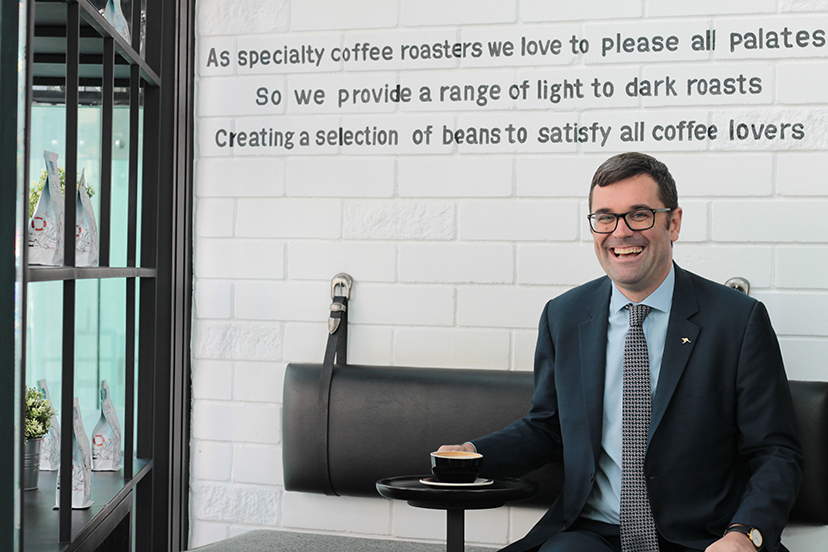
“I am always pleased to meet Kuwaitis in both the private sector and the government, who have studied In Australia.” Source: bazaar Studios
There seems to be an innate sense of entrepreneurialism in Kuwait, how has that helped Australian business expansion into Kuwait? Australians are traders like Kuwaitis. We share with Kuwait the spirit of entrepreneurship and free trade. Like Kuwait, our businesses look beyond national borders and trade with the world. Australian business has a long history of trading with Kuwait, particularly in the area of agribusiness. For decades we have been providing meat, vegetables, fruits, wheat and grains to Kuwait.
In many ways, we are Kuwait’s food partner of choice, and I am pleased to see that in recent years, Australian food and beverage franchises – which have a large footprint in the Asia Pacific – are starting to open in Kuwait. Plus, as the world’s political and economic focus increasingly moves to the Asia Pacific region, Australia is uniquely placed to serve as a hub for Kuwait in this fast growing and dynamic region.
Are the numbers of Kuwaitis traveling to Australia for education increasing and does this lead to more business partnerships in the long term?
Aside from the high quality and diverse range of university courses, Kuwaiti students love Australia’s optimism, friendliness, multiculturalism and natural beauty. The first words of many Kuwaiti students when they step off the plane is “I didn’t know [this about Australia]…”. Many are surprised at the dynamism and cultural diversity of cities such as Sydney and Melbourne, especially with the links to the Asia Pacific region.
Australia has recently overtaken the UK as the second largest destination for international students in the world, and overseas study is perfect for creating future business partnerships – we see this time and time again with Kuwait alumni after they return from their studies. As the world’s political and economic focus increasingly moves to the Asia Pacific, Australia is uniquely placed to serve as a hub for Kuwait in this fast growing and dynamic region.

“Australia takes its coffee very, very seriously.” Source: bazaar Studios
Briefly describe your route to diplomacy and what inspired you to enter this arena.
From an early age, I was fascinated by travel and other cultures and I always knew I wanted to be either a diplomat or a foreign correspondent. Being a diplomat won out in the end.
My grandfather was a British diplomat and spent most of his life in Malaysia and Brunei. Listening to his stories. And from that moment I knew what I wanted to do when I was older.
Who was the most surprised at your becoming a diplomat, you or your parents?
I think both myself and my parents were pleased when I joined the Australian Foreign Service. It was something that I worked towards for a number of years after university.
Do you have a sibling and if you do who is the more diplomatic?
A sister, who lives In London, and apologies to her if she is reading this, but it definitely is me.
What is the best thing about bringing up a family in Kuwait?
The safe, friendly and open atmosphere. Also the great schools here in Kuwait and the diversity of the community and experiences you can have. My 6-year- old loves going to the sh market and seeing the fresh catch. My wife enjoys exploring Souq Mubarakiya. Kuwait is a great place to be and our sense is that the county is moving forward with positive change.
You’re often seen supporting the arts, can you explain more about why is this important to you?
I think arts are the great connector between people and cultures. Especially when I am abroad, I nd it fascinating to see how different people from different backgrounds choose to express themselves whether it be through music, art, lm or poetry.
It’s been great to experience the vibrant arts scene here In Kuwait; there’s loads going on with very interesting people involved. I look forward to being more engaged in the arts scene in Kuwait going forward.
Australia isn’t the first country that comes to mind when considering coffee. Why do you think Australian coffee concepts are seeing successes in Kuwait?
Australia takes its coffee very, very seriously. And Australian baristas and roasters are having worldwide success. After WW2, a large Italian community migrated to Australia establishing cafés that produced outstanding cups of coffee. From there it just grew and grew to what it is today.
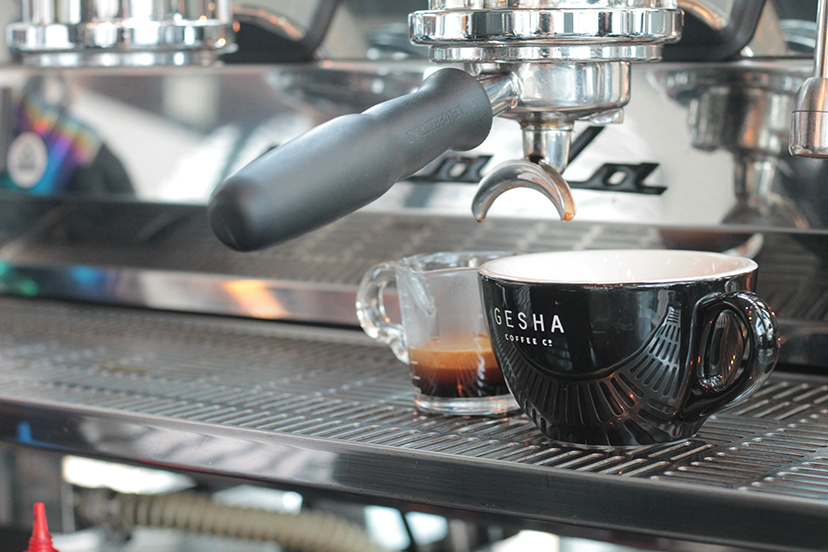
Gesha Coffee. Source: bazaar Studios
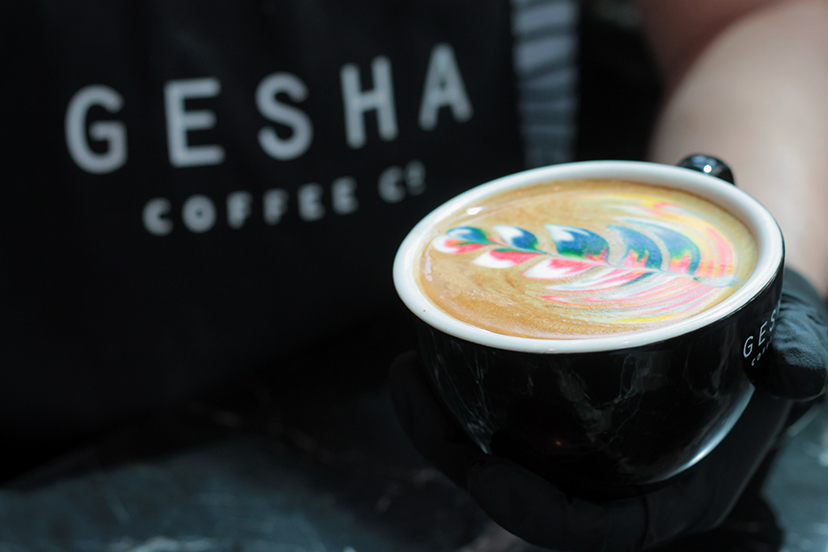
Gesha Coffee’s Rainbow Latte. Source: bazaar Studios
Melbourne alone boasts over 2000 cafes! Most cafés in Australia are independent which allows business owners to make their own mark and also try new things. So, I think these are the reasons that Australian coffee shops are springing up in Kuwait, and Kuwaitis are responding well to our brands .
What does an ideal day in the life of Jonathan Gilbert look like?
Every day is different In Kuwait. And the first nine or so months I have been here have been very busy as I have got to know Kuwaitis. However, so far, an ideal day for me In Kuwait is exploring the Friday market in the morning, lunch at Souq Mubarakiya with my wife, an afternoon swim with my six-year-old son, and a BBQ with friends for dinner.
What do you hope your legacy as HE Ambassador to Kuwait to be?
There are two areas that I would like to put in place during my tenure In Kuwait: The first is building a closer partnership between Australia and Kuwait in regard to the Implementation of the Kuwait Vision 2035 plan. I think there are a number of niche areas that Australia is well placed to assist Kuwait with going forward. These include renewable energy, smart grids and cities, health, food security, water management and environmental science. Kuwait and Australian needs in these are very compatible. And I think we have a lot of experience and expertise to share with the Kuwaitis on this.
The second is to build on Australia’s reputation as one of Kuwait’s closest friends and partners In the Asia Pacific.
Follow the Australian Embassy on Instagram @ausembkuwait and follow the hashtag #gdaykuwait to see the Ambassador’s exploits out and about town.
All photography and featured image by bazaar Studios.



